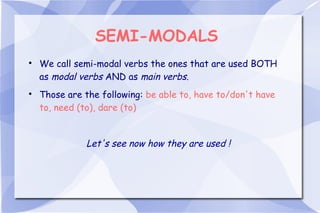
Semi modals
- 1. SEMI-MODALS We call semi-modal verbs the ones that are used BOTH as modal verbs AND as main verbs. Those are the following: be able to, have to/don't have to, need (to), dare (to) Let's see now how they are used !
- 2. Be able to + infinitive Ability (in all simple tenses) Note: We use it to talk about ability in the past especially in affirmative and interrogative/question where could cannot be used. e.g. I am not able to drive a car. Were you able to do your homework? I was able to finish the project on time.
- 3. Talk about your abilities! Think of more!
- 4. When I was a baby,...(lack of ability in the past)
- 5. Ability in the Past What else were you able to do at the same age?
- 6. Ability in the Future! What will you be able to do?
- 7. Have to + infinitive Obligation (can be used in all simple tenses instead of must) e.g. I have to tidy my room this weekend. I had to go shopping with mum on Saturday.
- 8. Not have to + infinitive To show that something is unnecessary (used in all simple tenses) e.g. Mum, I don't have to study today. It's Sunday ! I didn't have to go to school yesterday .
- 9. Role play between an employer and an employee! You haven't been a good employee and your boss is about to fire you. Use have to and not have to!
- 10. Needn't, don't/doesn't need to +infinitive To show that something is unnecessary Note: As a main verb it is followed by an infinitive with to. e.g. I need to speak to Tom. BUT as a modal verb it is followed by an infinitive without to and is NOT used in the affirmative. e.g. Need she check this report? You needn't come with me.
- 11. BE CAREFUL ! e.g. Need we buy more food? Yes, we must. OR No, you needn't. (NOT : Yes, we need.) Must I explain it again? Yes, you must. No, you needn't/don't have to. (NOT: No, you mustn't. )
- 12. Didn't need to + infinitive To show that something was unnecessary and didn't happen in the past e.g. She didn't need to take a taxi because she had her own car. (She didn't take a taxi)
- 13. Needn't have + past participle To show that something was unnecessary in the past but it happened You needn't have brought any bread. I've already bought some. (She brought bread !)
- 14. Santa,...it wasn't necessary...How else could you say that?
- 15. Dare To show that someone is (not) afraid of something As a main verb, it is followed by an infinitive with to in the affirmative. In the negative and interrogative to is optional. e.g. He is a man who dares to fight for his rights. He doesn't dare (to) ask for more money. Do you dare (to) be honest with him?
- 16. Dare As a modal verb it is followed by an infinitive without to and is not usually used in the affirmative. e.g. I daren't tell him it was my fault. Dare she deal with them alone? ALSO: How dare you say that to me? Mum, can I start wearing make-up? Don't you dare !
- 17. Worth knowing ! Remember ! Need and dare are usually used as main verbs in American English. Expressions similar to modal verbs: be + to + infinitive ( e.g. These are to be sent today) be supposed + to + infinitive ( e.g. You were supposed to bring it back on Monday. ) be likely + to + infinitive (e.g. She is likely to be back tonight)
- 18. Role play ! You have just found out your friend has lied to you about something important . Use as many modals as you can ! Two teams on board and the winner is the one which used the most modals.